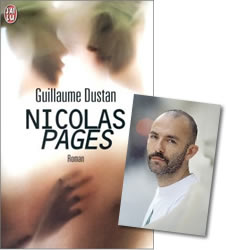Happy Harvey Milk Day!
****
Five years back, after learning of his death, I wrote about Guillaume Dustan (1965-2005), the enfant terrible of late 20th century French gay male literature. I won't restate all of that here, except to note that around the age of 30, he began publishing a series of novels, drawn directly from his life, that placed him squarely at the center of the French autofiction movement, in which autobiography and fiction are so closely merged that they unsettle the question of genre. Dustan published 8 or 9 books, most of them fiction but several works of philosophical essays, especially on the topic of queerness, before his death, from an accidental drug overdose. He was also an editor for Balland's now extinct Rayon Gay line--which I also wrote about on here, and which is how I first learned about and had a brief email exchange with him, getting clearance for a translation--and a film producer and actor. Dustan's first three books, only one of which, Dans ma chambre (In My Room) from 1996, has been translated, are pulse-like accounts of his very active sex-and-love life, but they are also shorn of sentimentality; the concise, speedy, casual prose paints a rich picture, often full of feeling, without evoking affect in the usual ways. In 1999, he published the novel Nicolas Pages, which was somewhat of a departure. Denser, more full of anecdotes, digressions, and self-analysis and philosophizing, it takes up Dustan's pursuit of and relationship with the eponymous, younger author and conceptual artist,
 Nicolas Pages (1970-, at right), who had only a few years before, in 1997, published his first book, Je mange un oeuf, which I've I translated a portion of. I subsequently did translate some of Dustan's novel, and realized this week, while teaching a unit on conceptual writing and rereading the works of Rob Fitterman, Tan Lin, and many others, that one way to think about Pages' first novel, and a good deal of the more chronologically-grounded, stylistically flat or affectless, verisimilitudinous works like Pages, would be as a form of documentary realism, or conceptual fiction. Pages, as I noted is a conceptual artist, but as far as I can tell, I haven't seen that link made in US criticism, though Pages and Dustan are frequently linked to Bret Easton Ellis, whose influence is evident in their work, and whom both approvingly cite repeatedly. (Other writers whose names have been evoked in relation to both are Renaud Camus, Hervé Guibert, Céline, and the American queer master Dennis Cooper.) One great aspect of reading and translating Dustan's Nicolas Pages was seeing his appreciation of Pages' first book stated so clearly and forcefully in the opening pages of the novel; I have long wondered if it was just me who saw validity in what Pages was doing. Now that Goldsmith and company are big, perhaps there will be more appreciation for at least some of their counterparts, especially Pages and the late Dustan, overseas.
Nicolas Pages (1970-, at right), who had only a few years before, in 1997, published his first book, Je mange un oeuf, which I've I translated a portion of. I subsequently did translate some of Dustan's novel, and realized this week, while teaching a unit on conceptual writing and rereading the works of Rob Fitterman, Tan Lin, and many others, that one way to think about Pages' first novel, and a good deal of the more chronologically-grounded, stylistically flat or affectless, verisimilitudinous works like Pages, would be as a form of documentary realism, or conceptual fiction. Pages, as I noted is a conceptual artist, but as far as I can tell, I haven't seen that link made in US criticism, though Pages and Dustan are frequently linked to Bret Easton Ellis, whose influence is evident in their work, and whom both approvingly cite repeatedly. (Other writers whose names have been evoked in relation to both are Renaud Camus, Hervé Guibert, Céline, and the American queer master Dennis Cooper.) One great aspect of reading and translating Dustan's Nicolas Pages was seeing his appreciation of Pages' first book stated so clearly and forcefully in the opening pages of the novel; I have long wondered if it was just me who saw validity in what Pages was doing. Now that Goldsmith and company are big, perhaps there will be more appreciation for at least some of their counterparts, especially Pages and the late Dustan, overseas.








